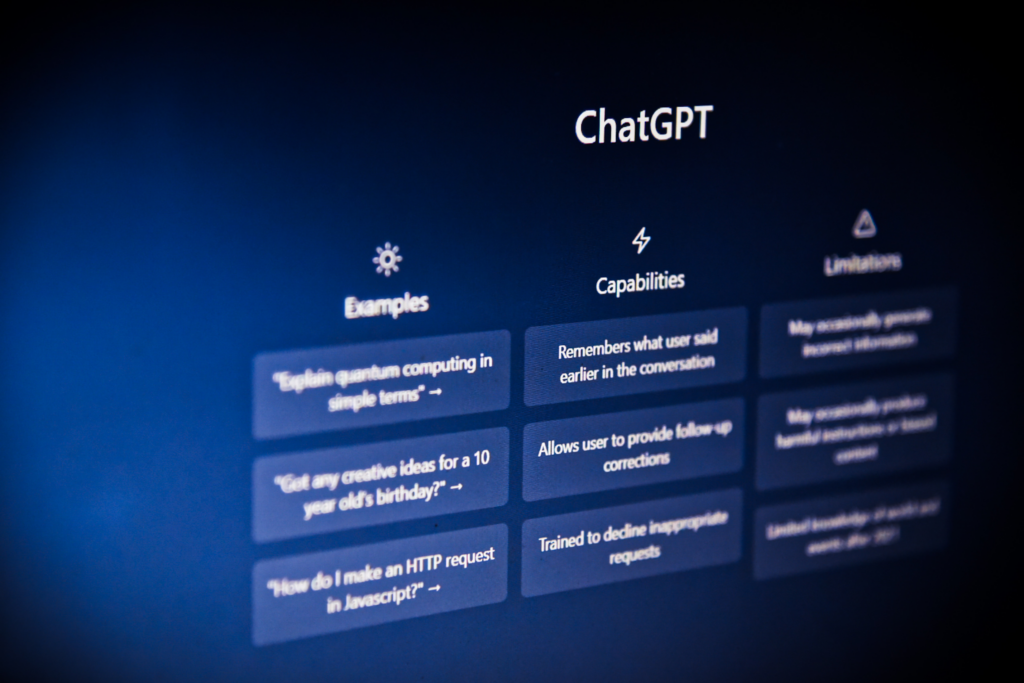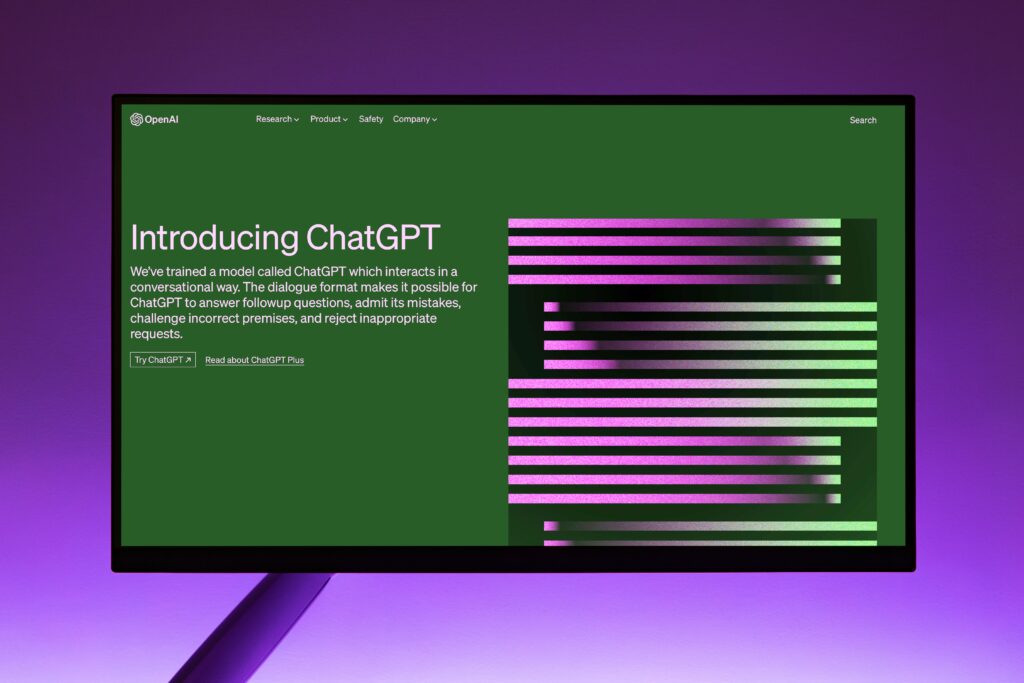
Exploring ChatGPT's Potential: Use Cases & Applications
In today’s digital age, the rapid advancement of artificial intelligence has ushered in a new era of human-machine interaction. One remarkable innovation leading this charge is OpenAI’s ChatGPT. This language model, equipped with state-of-the-art natural language processing capabilities, has not only set new benchmarks but also opened up a world of possibilities in the realm of AI conversational agents.
In this blog post, we will embark on an exploration of ChatGPT’s immense potential, unveiling its diverse use cases and practical applications. Join us as we venture into the fascinating landscape of ChatGPT, where the boundaries of human-machine conversation are continually pushed, and AI becomes an indispensable part of our daily lives.

The Power of Conversational AI
Conversational AI has undergone a remarkable transformation in recent years, thanks to substantial advancements in natural language processing (NLP) models, with OpenAI’s ChatGPT leading the way. These sophisticated language models are not just a leap forward; they’re a quantum leap in AI capabilities. They possess the uncanny ability to understand context, generate human-like responses, and provide accurate information across a wide range of domains. It’s no wonder that conversational AI is taking the world by storm.
One of the most remarkable aspects of ChatGPT is its adaptability. It’s not limited to a specific industry or application; instead, it can be customized and fine-tuned to excel in various contexts. This adaptability is what makes conversational AI so powerful and versatile. Whether you’re a business looking to enhance customer support, an educator seeking innovative ways to engage students, or an individual wanting a virtual assistant that truly understands your needs, ChatGPT can be tailored to meet your requirements.
The Versatility of ChatGPT
Let’s explore the versatility of ChatGPT through some key applications and use cases:
- Customer Support: Businesses are leveraging ChatGPT to provide round-the-clock customer support. These AI chatbots can answer frequently asked questions, assist with troubleshooting, and guide users through various processes. This not only enhances customer satisfaction but also reduces the workload on human support agents.
- Education: ChatGPT is becoming an invaluable tool in education. It can serve as a tutor, answer student queries, and even generate educational content. This technology is particularly useful in a remote learning environment, where personalized assistance can be challenging to provide.
- Content Generation: ChatGPT’s ability to generate human-like text makes it a powerful tool for content creation. It can assist writers, bloggers, and marketers by suggesting ideas, providing research material, and even composing articles or marketing copy.
- Knowledge Sharing: Online communities and platforms are using ChatGPT to facilitate knowledge sharing. Users can ask questions, and ChatGPT can provide detailed and informative answers, fostering a culture of learning and information exchange.
- Social Media Interaction: ChatGPT is making waves on social media platforms. It can help businesses engage with their audience, respond to inquiries, and even create entertaining or informative posts.
- AI Chat Applications: Beyond its specific applications, ChatGPT serves as the backbone of many AI chat applications. Developers are integrating ChatGPT into chatbots, virtual assistants, and various text-based conversational interfaces.
As we delve deeper into this blog, we’ll explore each of these applications in detail, shedding light on how ChatGPT is reshaping industries and revolutionizing the way we interact with AI-powered chat systems. ChatGPT is not just a technology; it’s a bridge between humans and machines, enabling more natural and efficient communication.
Enhancing Customer Support
In the ever-evolving landscape of customer support, businesses are continually seeking innovative ways to provide efficient and effective assistance to their clientele. Enter ChatGPT, a game-changer in the realm of customer service. By integrating ChatGPT into their websites and messaging platforms, companies are revolutionizing the way they interact with customers and addressing their needs promptly and effectively.
Real-Time Assistance, Anytime, Anywhere
One of the most significant advantages of ChatGPT in customer support is its availability around the clock. Unlike human agents who need rest, ChatGPT is tirelessly at work, ready to engage with customers whenever they require assistance. This means that whether it’s the middle of the night or during peak business hours, customers can access the support they need promptly.
Automating Responses
One of the primary ways businesses are leveraging ChatGPT is by automating responses to frequently asked questions. ChatGPT’s natural language understanding capabilities enable it to comprehend customer queries and provide accurate, informative, and context-aware answers. This automation not only reduces the workload on human support agents but also ensures consistency in responses.
Efficiency and Reduced Wait Times
Customers today expect quick resolutions to their inquiries. Long wait times and delays can lead to frustration and dissatisfaction. ChatGPT excels in providing rapid responses, significantly reducing wait times for customers. This efficiency not only enhances the customer experience but also allows companies to handle a higher volume of inquiries effectively.
Personalized Assistance
ChatGPT’s ability to analyze and understand user queries extends to personalization. It can tailor responses based on user behavior, previous interactions, and preferences. This personal touch makes customers feel valued and understood, enhancing their overall satisfaction with the support experience.
Increasing Customer Satisfaction
Ultimately, the goal of any customer support initiative is to increase customer satisfaction levels. ChatGPT plays a crucial role in achieving this objective. Its responsiveness, accuracy, and ability to provide consistent support contribute significantly to positive customer interactions. Satisfied customers are more likely to become loyal customers and brand advocates.
Real-World Examples
Several companies have already integrated ChatGPT into their customer support workflows with remarkable success. For instance, e-commerce businesses are using ChatGPT-powered chatbots to assist customers with product recommendations, order tracking, and addressing common queries. Telecom companies are deploying ChatGPT to troubleshoot technical issues and provide self-service support options. The financial sector is implementing ChatGPT to assist customers with account inquiries and guide them through various banking processes.
ChatGPT is reshaping the landscape of customer support by offering real-time assistance, automating responses, improving efficiency, personalizing interactions, and ultimately increasing customer satisfaction. As businesses continue to recognize the potential of ChatGPT in enhancing their customer support operations, we can expect even more innovative applications in the future.
Virtual Personal Assistants
In an era marked by hectic schedules and an ever-expanding list of daily tasks, the demand for virtual personal assistants has surged. People are turning to technology to help them streamline their lives, and ChatGPT is stepping into this role with remarkable capabilities. This section delves into how users can harness the power of ChatGPT as a virtual personal assistant for a wide range of tasks and responsibilities.
Efficient Scheduling and Reminders
One of the most practical applications of ChatGPT as a virtual personal assistant is in scheduling appointments and setting reminders. Users can interact with ChatGPT through text-based or voice-based interfaces to input their appointments and important dates. ChatGPT can then manage these schedules, sending timely reminders to ensure users never miss a meeting or a significant event again.
Data Analysis and Insights
ChatGPT’s analytical abilities extend beyond natural language understanding. It can help users analyze data by interpreting data sets, charts, and graphs. Whether it’s examining sales figures, financial reports, or market trends, ChatGPT can assist in extracting valuable insights, allowing users to make informed decisions quickly.
Research Assistance
For students, researchers, and professionals alike, ChatGPT can serve as a knowledgeable research assistant. Users can pose questions, request explanations, or seek recommendations for further reading. ChatGPT can generate concise summaries of complex topics, saving users valuable time in their pursuit of knowledge.
Effortless Content Creation
Another remarkable application of ChatGPT as a virtual personal assistant is in content creation. Whether users need assistance in drafting emails, writing reports, or composing articles, ChatGPT can generate drafts based on user inputs. It can also help refine writing styles, suggest improvements, and ensure that the final output is polished and professional.
Tailored Recommendations
ChatGPT doesn’t just provide generic responses; it can offer personalized recommendations based on user preferences and past interactions. For example, if a user is planning a trip, ChatGPT can suggest destinations, provide travel tips, and even assist in booking accommodations, all tailored to the user’s specific interests and requirements.
24/7 Availability
One of the standout features of ChatGPT as a virtual personal assistant is its availability around the clock. Users can access its assistance whenever they need it, whether it’s during business hours, late at night, or on weekends. This availability ensures that users can rely on ChatGPT’s support whenever they face a task or challenge.
Real-World Usage
The real-world applications of ChatGPT as a virtual personal assistant are vast. Professionals use it to draft emails and reports more efficiently. Entrepreneurs rely on it for market research and data analysis. Students turn to it for study help and research guidance. In essence, ChatGPT becomes a versatile tool that adapts to users’ needs, providing valuable support in various aspects of their lives.
ChatGPT’s role as a virtual personal assistant extends beyond mere conversation. It offers practical solutions for managing schedules, analyzing data, conducting research, creating content, and delivering tailored recommendations. As users continue to explore the versatility of ChatGPT in their daily lives, its capabilities as a virtual personal assistant will likely evolve, providing even more convenience and efficiency.
Educational Support Systems
The landscape of education underwent a profound transformation with the advent of online learning, a change that accelerated during the COVID-19 pandemic. As classrooms moved into the digital realm, the need for effective support systems became paramount. Enter ChatGPT, a versatile tool that educators and learners are now leveraging to enhance the quality of online education. This section explores the multifaceted role of ChatGPT in educational support systems.
Instant Answers and Explanations
One of the primary ways in which ChatGPT contributes to education is by offering instant answers and explanations. Learners can pose questions related to their coursework, assignments, or any topic they wish to explore further. ChatGPT responds with concise and accurate explanations, acting as an on-demand tutor available 24/7.
Interactive Learning Experiences
ChatGPT goes beyond static text responses; it can engage learners in interactive learning experiences. Through chat interfaces, learners can participate in quizzes, simulations, and problem-solving exercises guided by ChatGPT. This gamified approach not only enhances engagement but also reinforces the learning process.

Support for Diverse Subjects
Whether it’s mathematics, science, literature, history, or any other subject, ChatGPT’s vast knowledge base allows it to provide support across a wide range of topics. Educators and learners alike can turn to ChatGPT for insights, explanations, and additional resources related to their specific subjects of interest.
Language Learning Aid
For language learners, ChatGPT serves as a valuable language assistant. It can assist in vocabulary acquisition, sentence structure, and pronunciation. Learners can engage in text-based conversations with ChatGPT to practice their language skills and receive real-time corrections and feedback.
Accessibility and Inclusivity
ChatGPT’s accessibility makes it an inclusive tool for learners of all backgrounds and abilities. It caters to various learning styles, including visual, auditory, and kinesthetic, making it adaptable to different educational needs. Moreover, it can assist learners with disabilities, providing text-based support that is accessible to screen readers and other assistive technologies.
Teacher Support
Educators also benefit from ChatGPT’s capabilities. It can assist teachers in curriculum planning, lesson development, and even generating test questions. Additionally, it serves as a knowledge resource for educators seeking to stay up-to-date with the latest educational trends and research.
The Future of Online Education
The integration of ChatGPT into educational support systems is emblematic of the evolving nature of online education. As the technology continues to advance, ChatGPT’s role in education is expected to expand further. It may include features such as personalized learning pathways, adaptive assessments, and more sophisticated simulations, creating a richer and more interactive online learning experience.
ChatGPT’s role in educational support systems has transformed online learning into a dynamic and engaging process. Whether it’s providing instant answers, facilitating interactive experiences, supporting diverse subjects, aiding language learners, promoting accessibility, assisting teachers, or shaping the future of online education, ChatGPT has become an indispensable tool for both educators and learners.

Content Generation and Revision
Content creation, whether it’s for professionals, writers, or students, can often be a time-consuming and challenging endeavor. Enter ChatGPT, a revolutionary tool that has streamlined the content generation and revision process. With its ability to generate coherent text based on prompts and revise existing content, ChatGPT has become an invaluable companion for individuals seeking to enhance their writing productivity. In this section, we will delve into how professionals, authors, and students leverage ChatGPT to improve their writing tasks.
Inspiration for Authors and Creatives
For authors and creative writers, inspiration is a critical element of their craft. ChatGPT provides a wellspring of inspiration by generating ideas, prompts, and even entire storylines. By simply providing a seed sentence or topic, authors can receive creative suggestions and jumpstart their writing process.
Efficient Draft Revision
Writers often go through multiple drafts and revisions to refine their work. ChatGPT can expedite this process by offering fresh perspectives and recommendations. Authors can input their drafts, and ChatGPT can suggest edits, rephrase sentences, or provide alternative phrasing, helping writers refine their content more efficiently.
Academic Writing Assistance
Students and academics can also benefit from ChatGPT’s capabilities. Whether it’s crafting essays, research papers, or academic articles, ChatGPT can assist with generating content, providing citations, or offering explanations. It serves as a valuable tool for students looking to improve the quality of their writing and the depth of their research.
SEO-Optimized Content
In the digital age, SEO optimization is crucial for content creators. ChatGPT can assist in generating SEO-friendly content by suggesting relevant keywords and optimizing text for search engines. This feature is particularly valuable for bloggers, content marketers, and businesses looking to enhance their online presence.
Multilingual Content Creation
ChatGPT’s multilingual capabilities make it an ideal tool for generating content in various languages. It can aid in content localization, translation, and the creation of materials for diverse audiences, expanding its utility for global content creators.
Streamlined Professional Communication
Professionals across industries often require well-crafted emails, reports, and memos. ChatGPT can help in composing professional communications, ensuring clarity and coherence in business correspondence.
Innovative Marketing Campaigns
Content marketing and advertising professionals can harness ChatGPT to brainstorm creative marketing ideas, draft ad copies, and even develop engaging storytelling campaigns. ChatGPT’s ability to generate persuasive content enhances marketing strategies.
Future of Content Creation
As ChatGPT continues to evolve, its role in content creation and revision is expected to grow. Future developments may include more advanced content suggestions, personalized writing assistance, and integrations with content management systems, further revolutionizing how individuals and businesses approach content creation.
ChatGPT’s contribution to content generation and revision is transforming the way professionals, writers, and students approach their tasks. Whether it’s inspiring authors, revising drafts, assisting with academic writing, optimizing for SEO, enabling multilingual content creation, streamlining professional communication, or driving innovative marketing campaigns, ChatGPT has become an indispensable ally in the realm of content creation.
Inspiring Creativity in Artistic Fields
Artists and creatives have long sought inspiration from diverse sources to fuel their imaginative journeys. In recent years, AI collaboration tools like ChatGPT have emerged as innovative companions for artists, providing unique perspectives and generating novel concepts based on input. This section delves into the myriad ways artists are integrating chatbots like ChatGPT into their artistic processes, sparking new levels of creativity.
Ideation and Concept Generation
One of the primary ways artists utilize ChatGPT is for ideation and concept generation. By presenting a set of keywords, themes, or ideas to ChatGPT, artists can receive a wealth of creative suggestions. These suggestions can serve as a foundation for art projects, guiding the initial stages of the creative process.

Generating Art Prompts
ChatGPT’s ability to generate art prompts is a valuable asset for artists looking to break free from creative blocks. Artists can provide ChatGPT with details about their preferred style, medium, or subject matter, and in return, receive thought-provoking prompts that inspire new artwork.

Exploring New Styles and Techniques
Artists often seek to expand their repertoire by exploring new artistic styles and techniques. ChatGPT can offer insights and recommendations for trying out different styles, experimenting with various brush techniques, or incorporating unique elements into their work.
Collaborative Art Projects
ChatGPT can serve as a virtual collaborator for artists engaging in collaborative art projects. It can contribute ideas, suggest modifications, or even co-create art pieces, fostering a sense of collaboration and experimentation.
Artistic Interpretation and Analysis
For art enthusiasts and critics, ChatGPT can provide valuable insights into the interpretation and analysis of artworks. By describing an artwork or providing context, users can engage in conversations with ChatGPT to gain fresh perspectives and interpretations.
Expanding Creative Horizons
ChatGPT serves as a limitless source of inspiration, encouraging artists to venture into uncharted creative territories. Whether it’s experimenting with surrealism, exploring abstract concepts, or reimagining classical styles, ChatGPT’s suggestions can expand creative horizons.
Enhancing Storytelling Through Art
Visual storytelling often plays a pivotal role in artistic endeavors. ChatGPT can assist artists in weaving compelling narratives into their artwork, enhancing the storytelling aspect of their creations. This is particularly valuable for graphic novelists, illustrators, and concept artists.
Artistic Community Engagement
Artistic communities can benefit from ChatGPT by using it as a tool for engaging members in creative discussions. Artists can organize AI-assisted brainstorming sessions or collaborative art challenges, fostering a sense of community and innovation.
Future of Artistic Collaboration
As AI technology continues to advance, the role of AI collaboration tools like ChatGPT in artistic fields is expected to evolve. Future developments may include AI-generated art pieces, AI-guided interactive installations, and even AI-driven virtual art exhibitions, opening up new avenues for artistic expression.
ChatGPT’s integration into artistic processes has ignited a new wave of creativity among artists and creatives. By providing unique perspectives, generating innovative prompts, and fostering collaboration, ChatGPT has become a valuable asset for those seeking to push the boundaries of artistic expression.
Ethical Considerations
As AI models continue to advance and play increasingly significant roles in our lives, it becomes crucial to address the ethical concerns surrounding their usage effectively. This section examines some of the key ethical considerations that arise when deploying conversational agents powered by technologies like GPT-4.
Privacy Protection
One of the foremost ethical considerations in the realm of conversational AI is privacy protection. When users interact with AI-powered chatbots or virtual assistants, their conversations and queries often contain sensitive or personal information. It is essential to establish robust privacy measures to safeguard this data from unauthorized access, breaches, or misuse. Clear and transparent privacy policies must be in place, and users should have the option to control the data they share.
Data Bias and Fairness
AI models like GPT-4 learn from vast datasets, and there’s a risk of inheriting biases present in those datasets. This can result in biased or unfair responses to users’ queries, perpetuating stereotypes or discriminatory content. Ethical considerations demand that developers actively work to identify and mitigate biases in AI models, ensuring that the technology provides fair and equitable responses to users across diverse backgrounds and cultures.
System Transparency
Transparency in AI systems is a critical ethical requirement. Users engaging with conversational agents should have a clear understanding of whether they are interacting with a machine or a human. Transparency can help manage user expectations and build trust. Developers should implement clear indicators or disclaimers when AI is involved in conversations to maintain transparency.
User Consent and Control
Respecting user consent and providing them with control over their interactions with AI is paramount. Users should be aware that they are interacting with an AI system and should have the option to opt out or stop interactions at any time. Additionally, users should have control over the data they share and how it is used. Ethical guidelines should prioritize user agency in AI interactions.
Guidelines for Developers and Users
Ethical AI usage relies on clear guidelines for both developers and users. Developers should adhere to ethical best practices in AI design and continuously monitor and update AI systems to ensure they align with these principles. Users should be educated about the capabilities and limitations of AI systems and encouraged to provide feedback on problematic content or interactions. The development and adoption of industry-wide ethical standards are essential to guide responsible AI usage.
Responsible AI Deployment
Ultimately, the responsible deployment of AI, including conversational agents like those powered by GPT-4, requires a holistic approach that considers not only technological advancements but also ethical considerations. Developers, policymakers, and users must collaborate to strike a balance between leveraging the capabilities of AI for positive purposes while safeguarding against potential ethical pitfalls.
As AI technologies continue to evolve, ethical considerations must play a central role in their development and deployment. Addressing concerns related to privacy, bias, transparency, user consent, and guidelines is essential to ensure that conversational agents like GPT-4 benefit society responsibly and ethically.
Navigating the Future of Conversational AI
This blog post has taken a deep dive into the diverse and exciting use cases for OpenAI’s ChatGPT. We’ve witnessed its potential to transform various aspects of our lives, from enhancing customer support experiences to serving as virtual personal assistants, aiding in education, streamlining content generation and revisions, and even inspiring creativity in artistic fields. However, as we embrace these technological advancements, it’s crucial to remain vigilant about the ethical considerations associated with Conversational AI technologies.
As AI-driven conversational agents like ChatGPT continue to improve and become more integrated into our daily lives, businesses, organizations, and individuals must navigate carefully. Responsible deployment and usage are paramount. This means not only capitalizing on the myriad benefits these technologies offer but also addressing concerns such as privacy protection, data bias, transparency, user consent, and the development of ethical guidelines.
The future of Conversational AI holds immense promise. It offers us the potential to revolutionize how we interact with technology, making it more intuitive, efficient, and personalized. By staying mindful of the ethical considerations and proactively working to mitigate potential challenges, we can ensure that the benefits of Conversational AI are harnessed in a way that positively impacts society and individuals alike.
In the coming years, as Conversational AI technologies continue to advance, it is our collective responsibility to harness their potential for the greater good while upholding ethical principles and ensuring responsible deployment.